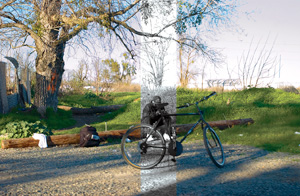 The Compassion Gap The Compassion Gap
Hurricane Katrina exposed more than the face of poverty in the United States, says sociologist Fred Block. It also revealed a historic schism in American attitudes—a “compassion gap” between traditions of helping and blaming the poor.
Throughout much of U.S. history, poverty has remained largely invisible to the public eye—until an exposé or a crisis such as the Great Depression or Hurricane Katrina brings it back to the top of the national agenda, Block said.
But each time, he said, periods of generosity have been followed by backlashes and cutbacks in public assistance, the most recent retreat beginning under the Reagan administration in 1980 and accelerating under every president since then.
Current welfare policy is framed by precepts dating back 200 years to Thomas Malthus, a founder of classical political economy and modern population theory who held that people are poor because they lack morals and discipline, Block and a colleague concluded in a recent article in the American Sociological Review.
Last spring, Block co-founded the Longview Institute to promote progressive ideals of social and economic justice. Other institute fellows include UC Davis sociology professor Carole Joffe and history professor emerita Ruth Rosen, as well as scholars from UC Berkeley, Portland State University and New York University.
Block points to the rising costs of housing, health care, child care and a college education, which are putting the American Dream farther out of reach—not only for the poor but for growing numbers of the middle class. But he suggests that “there’s an indication that the public recognizes that something’s wrong. This is reflected in overwhelming support for increasing the minimum wage.”
Related stories:
Homelesss—Poorest of the Poor
The homeless, says sociologist Dean MacCannell, are a lot like the rest of us—with dreams of a decent job, good home and a nice vacation. The difference is that “their relationship to the world is broken, usually by a drug or alcohol problem.” [more]
The New Rural Poor
Mention poverty and many people think of the inner cities. But a number of small Central Valley towns have poverty rates rivaling those found of the poorest neighborhoods of Los Angeles and Oakland. [more]
Students Help
Tu Tran Huynh was deeply touched by the homeless children she met as a high-school volunteer at Sacramento’s Loaves and Fishes dining hall. She wanted to do more to help, so as a sophomore at UC Davis she co-founded a student organization to advocate for the local poor. [more]
The Poor Get Poorer
Since 2001, the U.S. economy has been growing and the standard of living going up, but more than 4 million more Americans have slipped into poverty. Three UC Davis economists recently took a closer look at the reasons why and found the answer lies largely in a growing wage gap. [more]
Back to introduction, Poverty in the Land of Plenty,

Kathleen Holder is associate editor of UC Davis Magazine. Photos by Karin Higgins/UC Davis.
|

